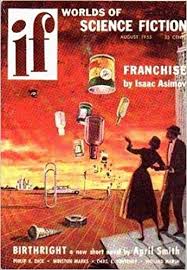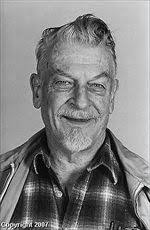The Patriot
Earth was through with war. And while it is right that man have peace, it is also right that he have freedom. But Mars was in slavery, and to Mars Cornel Lorensse dedicated his life and his talent....
The Martianne is heard occasionally these days as a stirring concert or band selection. But there was a time when its playing was punishable by death—and its defiant strains challenged the harried police in tavern and drawing room all over the Earth. In the days just before one marche militaire changed two worlds, Earth was weary of war, afraid of war, and desired to put behind it all reminders of war. The psychosociologists said uniforms of policemen, of postmen, of airline pilots, of lodge brethren, of theater ushers, were militaristic, and they were abolished. The psychosociologists said the march rhythm in music was nationalistic and instigated combative feelings, and it was banned. The scenes, the sounds, the sights of antagonisms between men were forbidden. The Polonaise, the Marseillaise, the March of the Toys, all suffered the same fate. Sousa's marches and Tschaikovsky's 1812 Overture went the same way. Dixie and the Hawaiian War Chant were treated alike. All were relegated to tape in dusty archives, and their sale or public performance forbidden on pain of fine and prison sentence. Whatever unlawful violence there might be on faraway Mars, Earth was through with all forms of war and its trappings. Into these circumstances, Cornel Lorensse intruded on the night of December 6, 2010. He pressed his thin face against the steam-misted window of The Avatar in Nuyork and saw a piano standing idle inside. The Avatar was one of those small restaurants sunk a few feet below sidewalk level, which catered with exotic dishes to the tastes of a select group. It was well-populated at this hour, and Cornel licked his lips hungrily at the epicurean delights unveiled at each table. He felt in the pocket of his worn coveralls. A single coin answered the exploration of his fingers. He was down to his last resource, and he was no nearer to finding the Friends than he had been when he landed. He looked again at the piano, hesitated, then went down the three steps to the restaurant's door, pushed it open and went in. It was his good fortune that Wan Ti, owner of The Avatar was receiving his guests in person at the moment. "I'll play you a concert for a meal," said Cornel, gesturing toward the piano. Wan Ti's dark eyes swept over him, taking in the battered coveralls, the earnest face, the untrimmed blond hair, the slender hands. Wan Ti's yellow countenance remained bland. "I have a piano player," said Wan Ti. Cornel laughed, with a note of desperation in his tone. "Let me play one selection," he urged. "If you want to stop me then, you can kick me out." What Wan Ti thought could not be gauged from his expression, but he had not built his clientele against fierce competition by turning his face away from the unusual. He inclined his head slightly, and waved Cornel to the piano. Cornel sat down at the keyboard, brushed his hair back from his eyes, and flexed his long fingers. Thrusting the tantalizing aroma of food to the back of his mind, he played. The murmur of conversation in The Avatar faltered and died as the fervid melody of Beethoven's Sonata Appassionata filled the air. It was unusual music to people accustomed to hearing the more modern compositions of Schonberg, Harris and Westine. The comparison of Cornel's inspired touch to the mechanical renditions of Wan Ti's regular piano player was noticeable even to those who were unfamiliar with music. When the final movements of the allegro ma non troppo faded, Cornel sat back and looked toward Wan Ti. The proprietor cocked an ear toward the rare applause, smiled and nodded slightly. Exultantly, Cornel swung into Chopin's Fantasie-Impromptu and followed it, not pausing, with Liszt's Waldesrauschen and Schubert's Serenade. The applause was just as enthusiastic, but by now the hum of voices and the click of eating utensils had begun to rise again. Frowning slightly, Cornel hunched his shoulders and began a composition the most musical of his audience had never heard before. Like the molten notes of the nightingale, the music floated and throbbed above the diners, almost a physical thing. The people in the restaurant paused with food halfway to their lips. They turned to see the artist, carefully, so that no chair would scrape. The waiters stopped with trays in their hands. Wan Ti stopped a newly arriving couple, his fingers at his lips. In the midst of the applause that roared through the room when Cornel had finished, a waiter tapped his shoulder. "Excuse me, sir," he said. "Miss Meta Erosine asks that you join her at her table." Rising and bowing to his audience, Cornel followed the man to a table at the rear of the room, where a woman sat with her escort. Meta Erosine's pale, heart-shaped face, with its mop of short black hair and luminous black eyes, was widely known on Earth, but Cornel had never been to Earth before. Her vibrant beauty blazed on a victim unprepared for it. She was clad in the cretan-can-can style just then becoming popular, with breasts exposed over a tight bodice and a short, ruffled skirt gathered in front to reveal the knees. She smoked a long-stemmed, tiny-bowled pipe, studded with jewels. Beside her sat a sleek, mustached young man in ruffled lavender shirt and pink tights, his fingers covered with rings. "Sit down and eat with me, musician," invited Meta. Somewhat dubiously, Cornel took a seat at her right, across the table from the beruffled escort. "Meta, I wish you wouldn't demean yourself by taking up with tramps and guttersnipes," objected her companion, wrinkling his nose. "Leave me, Passo," she ordered, waving an imperious hand. "Why should I sup with painted popinjays when I can adore genius?" Passo flushed and his mouth fell open. But he arose and slunk quietly away. "Now, musician," said Meta, leaning over the table so that her powdered breasts brushed the glassware, "tell me, what was that last number you played?" "One of my own compositions," he said diffidently. The odor of food was too much for him, and he leaned across the table to appropriate Passo's untouched salad. "Its name is Wind in the Canals." "It should be Le Vent dans les Canals," she said. "You should title your compositions in French—they will be more fashionable." "I don't know French," he said, munching a stick of celery. "We don't speak French on Mars." She laughed, a laugh like the music of his playing. "You will, my genius," she promised him. Her eyes ran over his lean face, his unkempt hair. "You look as though you could use shelter and clothing. Come home with me tonight. I shall give your genius to the world." Cornel never had experienced such luxury as was his in the apartment Meta assigned to him in her magnificent home in Jersi. He had his personal servant. New clothes were waiting for him. A barber cut his hair when he had finished a hot, scented bath, and the big bed in which he slept was soft as down. Meta asked no information of him until they met at a late breakfast the next morning. There, beautiful in translucent white negligee, she sipped her coffee and asked questions.
Translation
Translate and read this book in other languages:
Select another language:
- - Select -
- 简体中文 (Chinese - Simplified)
- 繁體中文 (Chinese - Traditional)
- Español (Spanish)
- Esperanto (Esperanto)
- 日本語 (Japanese)
- Português (Portuguese)
- Deutsch (German)
- العربية (Arabic)
- Français (French)
- Русский (Russian)
- ಕನ್ನಡ (Kannada)
- 한국어 (Korean)
- עברית (Hebrew)
- Gaeilge (Irish)
- Українська (Ukrainian)
- اردو (Urdu)
- Magyar (Hungarian)
- मानक हिन्दी (Hindi)
- Indonesia (Indonesian)
- Italiano (Italian)
- தமிழ் (Tamil)
- Türkçe (Turkish)
- తెలుగు (Telugu)
- ภาษาไทย (Thai)
- Tiếng Việt (Vietnamese)
- Čeština (Czech)
- Polski (Polish)
- Bahasa Indonesia (Indonesian)
- Românește (Romanian)
- Nederlands (Dutch)
- Ελληνικά (Greek)
- Latinum (Latin)
- Svenska (Swedish)
- Dansk (Danish)
- Suomi (Finnish)
- فارسی (Persian)
- ייִדיש (Yiddish)
- հայերեն (Armenian)
- Norsk (Norwegian)
- English (English)
Citation
Use the citation below to add this book to your bibliography:
Style:MLAChicagoAPA
"The Patriot Books." Literature.com. STANDS4 LLC, 2025. Web. 22 Feb. 2025. <https://www.literature.com/book/the_patriot_77>.








Discuss this The Patriot book with the community:
Report Comment
We're doing our best to make sure our content is useful, accurate and safe.
If by any chance you spot an inappropriate comment while navigating through our website please use this form to let us know, and we'll take care of it shortly.
Attachment
You need to be logged in to favorite.
Log In